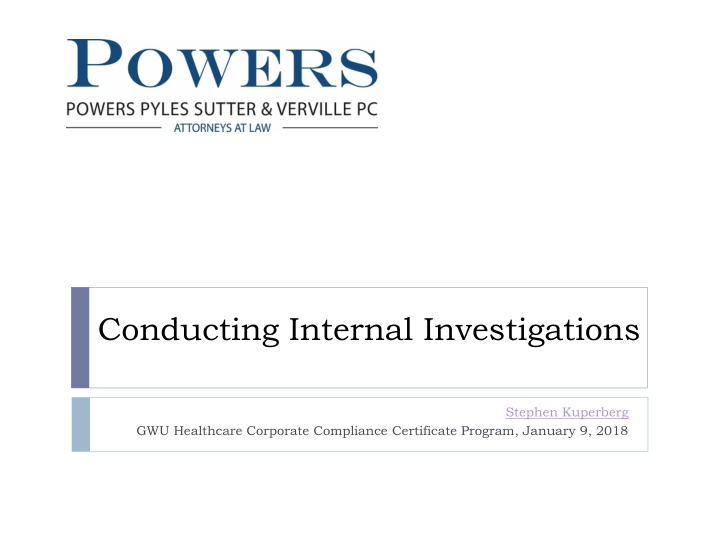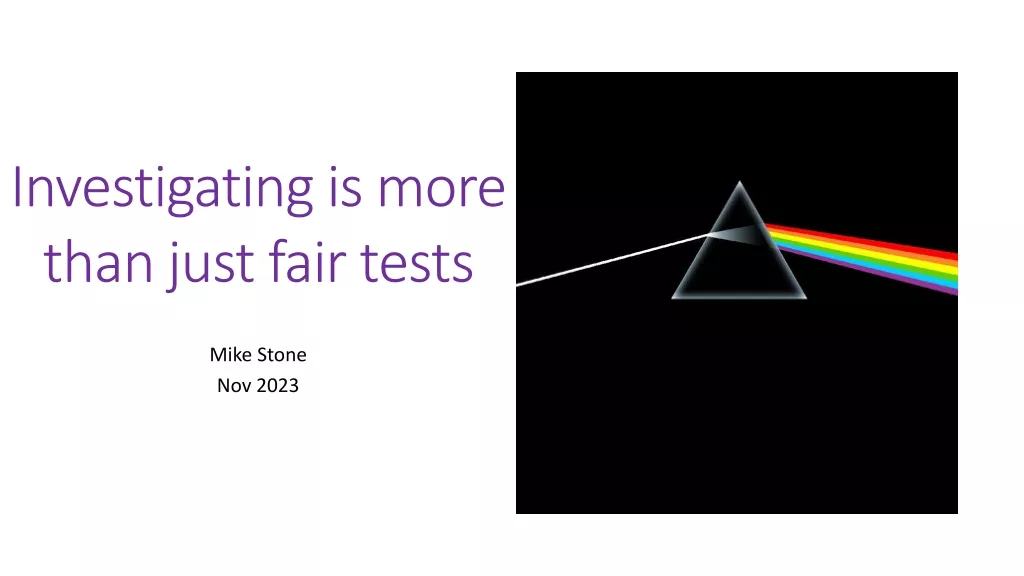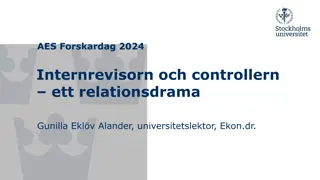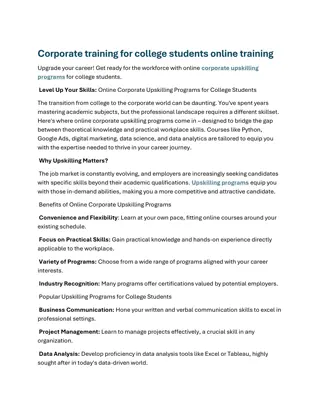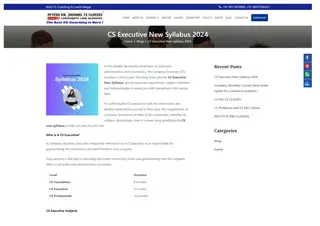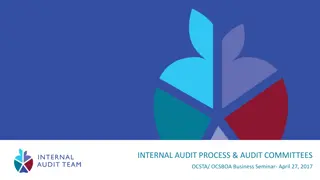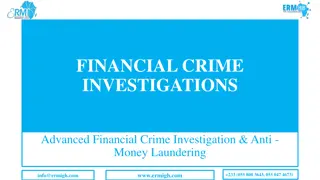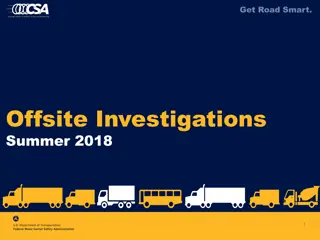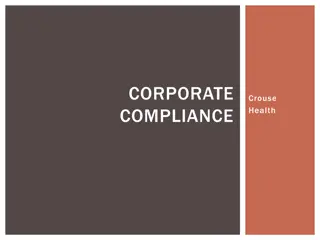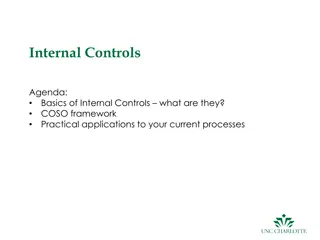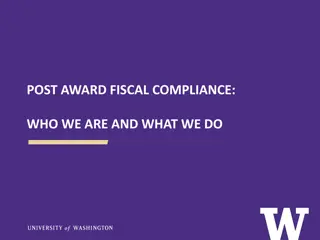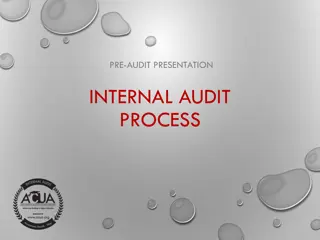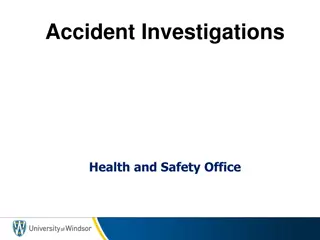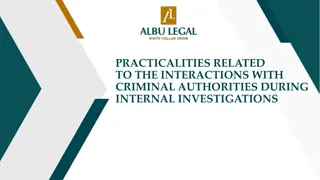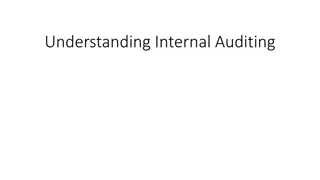Internal Investigations in Corporate Compliance
Understanding the importance of conducting internal investigations in corporate compliance is crucial to address potential misconduct, comply with regulations, and prevent legal implications. This article explores the reasons, methods, and benefits of internal investigations within organizations.
Download Presentation

Please find below an Image/Link to download the presentation.
The content on the website is provided AS IS for your information and personal use only. It may not be sold, licensed, or shared on other websites without obtaining consent from the author.If you encounter any issues during the download, it is possible that the publisher has removed the file from their server.
You are allowed to download the files provided on this website for personal or commercial use, subject to the condition that they are used lawfully. All files are the property of their respective owners.
The content on the website is provided AS IS for your information and personal use only. It may not be sold, licensed, or shared on other websites without obtaining consent from the author.
E N D
Presentation Transcript
Conducting Internal Investigations Stephen Kuperberg GWU Healthcare Corporate Compliance Certificate Program, January 9, 2018
Agenda Why conduct internal investigations How to conduct internal investigations What to obtain from internal investigations 2
Why conduct internal investigations? Investigate potential misconduct crucial compliance function Audit result Internal report Whistleblower 3
Why conduct internal investigations? No government inquiry yet OIG subpoena Civil investigative demand US Attorney office subpoena Congressional inquiry Dawn raid 4
Why conduct internal investigations? Get to the bottom of allegations Get ahead of external inquiries and related consequences Identify issues and weaknesses Stop any violations Implement remedial actions Prepare for any potential self-disclosure 5
Why conduct internal investigations? You want to be a good corporate citizen The government wants you to be a good corporate citizen If a good corporate citizen discovered clear evidence of wrongdoing, what would it do? 6
Why conduct internal investigations? If you find clear evidence of wrongdoing at any time STOP THE WRONGDOING IMMEDIATELY 7
Why conduct internal investigations? Why not conduct internal investigations? Internal investigations are retrospective and resource-intensive Business frequently involves cost-benefit analysis with limited resources 8
Why conduct internal investigations? Why not conduct internal investigations? Possibilities Issue is prospective, not retrospective Issue is conclusively isolated, defined, and over Issue is subject of specific prior guidance of counsel Issue is subject of a previously obtained OIG opinion letter specific to your organization Check. Your. Assumptions. 9
How to conduct internal investigations? Before starting internal investigations, should you check with legal counsel? Given the previous discussion, why not? 10
How to conduct internal investigations? Checking withlegal counsel doesn t necessarily mean involving legal counsel Certain benefits of legal counsel involvement particularly attorney- client privilege and work product protections do not apply retroactively Effective counsel can often provide guidance to reduce cost and effort 11
How to conduct internal investigations? When should legal counsel be involved? Allegations of Violations of law Intentional fraud or misrepresentation Audit results demonstrating a pattern reaching beyond isolated errors Activity or audit results that highlight ambiguous or contradictory guidance or rules Particularly important when government funds involved, but not only then 12
How to conduct internal investigations? Why should legal counsel be involved? Attorney-client privilege Typically no privilege for routine compliance investigations and materials 13
How to conduct internal investigations? Why should legal counsel be involved? Attorney-client privilege Protects Confidential Communications Between attorney and client For purposes of obtaining legal advice Can apply to current and former employees Can apply to attorney s experts 14
How to conduct internal investigations? Why should legal counsel be involved? Attorney-client privilege Common errors in establishing and preserving privilege Attorney not involved from outset Not confidential Not communications (doesn t protect underlying facts) Not between attorney and client Not for purposes of obtaining legal advice Confidentiality is most frequent issue 15
How to conduct internal investigations? Why should legal counsel be involved? Attorney-client privilege Just as important as establishing the privilege is choosing whether and when to waive it, and to whom If you never established an attorney- client privilege, or didn t maintain it, you don t get to choose later 16
How to conduct internal investigations? Four steps to internal investigations Plan Investigate Assess Correct and report Remember Don t wait to stop clear wrongdoing! 17
How to conduct internal investigations? Plan What potential wrongdoing are we investigating? What potential violations are implicated? Anti-kickback violations Fraudulent billing Privacy violations Marketing or promotional violations Self-referrals Anti-competitive actions or agreements Other federal or state law 18
How to conduct internal investigations? Plan Who knows about the issue? Who was involved? Who have we told? Remember that managementcan t act if they don t know about the issue The same is true of counsel 19
How to conduct internal investigations? Who should direct the investigation? Counsel Compliance team Potentially including HR Auditors Management 20
How to conduct internal investigations? Who should conduct the investigation? Counsel Compliance team Professional investigator Auditors IT 21
How to conduct internal investigations? What will be the reporting protocol? Consider both progress reporting and final reporting Internal investigation team Corporate management or board representatives 22
How to conduct internal investigations? Preserving documents establishing a document hold early is crucial Put the hold in writing Notify both employees and IT Suspend document retention policies Applies to IT as well as physical retention Hold backup tapes Potentially image crucial folders and drives 23
How to conduct internal investigations? Plan document collection and interviews Consider both time sensitivity and thoroughness Typically collect and review documents first if possible For complex financial and technical subjects, important to involve experts But the clock is ticking! 24
How to conduct internal investigations? Investigate knowledge center Collect documents and other materials (such as interview memoranda) centrally Be organized in your review Litigation databases helpful Create a centralized timeline-chronology 25
How to conduct internal investigations? Investigate interviews Your plan identified witnesses and you should be on the lookout for more Interview individually Counsel should be providing the corporate Miranda or Upjohn warnings Use documents to guide and probe Gather information Assess credibility but don t interrogate Be open, curious, information-seeking Take detailed notes, but not verbatim or recordings 26
How to conduct internal investigations? Investigate interviews When to interview a suspected wrongdoer Beginning, end, or both Give opportunity to respond to all accusations Be open, curious, information-seeking The flip side of the Upjohn warnings right to counsel 27
How to conduct internal investigations? Assess Oral or written report, and to whom Remember you planned for this Comprehensive summary Detailed description Appropriately sourced If making assessments or drawing conclusions, identify those assessments and their bases Provide opportunity for others to reach independent assessments if making assessments at all Recommend corrective action 28
How to conduct internal investigations? Correct and report In this case, deciding whether and how to report externally Discipline referrals and recommendations Follow-up and accountability on corrective actions 29
How to conduct internal investigations? Correct and report self-disclosure? Overpayment repayment obligations OIG self-reporting v. False Claims Act liability Other government disclosure programs Antitrust Leniency-amnesty program 30
How to conduct internal investigations? Correct and report self-disclosure? Overpayment repayment obligations OIG self-reporting v. False Claims Act liability Other government disclosure programs Antitrust Leniency-amnesty program 31
What to obtain What to obtain from internal investigations? A report, but also Corporate integrity Good standing with government and community Preservation of resources Efficient and effective services The clock is ticking But you got this 32
Questions? Steve Kuperberg Powers law firm Steve.Kuperberg@PowersLaw.com http://www.powerslaw.com 33
